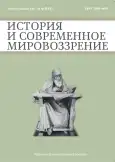German Capital in the Korean Economy in the Late XIX — Early XX Centuries on the Example of the Activity of the Trading Company «Eduard Meyer & Co»
- Authors: Musinova I.A.1
-
Affiliations:
- Ural Federal University named after the First President of Russia B. N. Yeltsin
- Issue: Vol 5, No 2 (2023)
- Pages: 93-98
- Section: DEBATING ISSUES OF GENERAL HISTORY AND INTERNATIONAL RELATIONS
- URL: https://bakhtiniada.ru/2658-4654/article/view/257444
- DOI: https://doi.org/10.33693/2658-4654-2023-5-2-93-98
- EDN: https://elibrary.ru/PNFLDY
- ID: 257444
Cite item
Abstract
The purpose of the research. The article examines the history of the trade expansion of German capital in East Asia, and, in particular, in Korea in the late XIX — early XX centuries on the example of the activities of one of the largest European trading houses «Eduard Meyer & Co». Conclusions. Until the middle of the XIX century, the German bourgeoisie wasn’t able to actively participate in colonial and semi-colonial trade expansion in non-European countries, it has begun only with the development of capitalism in the country. The liberal bourgeoisie of the German Empire sought to open non-European markets and conduct business in the spirit of free trade and competition. This process is clearly visible on the example of the activities of the largest German trading company in East Asia called «Eduard Meyer &Co». Its trade expansion in Korea began in the 1880s, when P.G. von Möllendorf held influential posts in Korean government. The company has received numerous commercial projects from the Korean government, such as the supply of equipment for a new Korean coin, the sale of weapons, the construction of telegraph lines and the maritime transportation. After the resignation of P.G. von Möllendorff, «the Eduard Meyer & Co.» had to join the struggle for concessions and economically profitable projects along with other foreign companies in Korea, and this struggle did not always end in success. In difficult conditions of the company «Eduard Meyer & Co» managed to adapt its own trading model to the Korean realities, which has worked successfully for several decades.
Full Text
##article.viewOnOriginalSite##About the authors
Irina A. Musinova
Ural Federal University named after the First President of Russia B. N. Yeltsin
Author for correspondence.
Email: irina.musinova@gmail.com
Master of History, Senior Lecturer of the Department of Oriental Studies, Ural Institute of Humanities
Russian Federation, YekaterinburgReferences
- Cha, Myung Soo. Facts and Myths about Korea’s Economic Past//Australian Review of Economic History, No. 44 (2004). Рр. 278–293.
- Deuchler M. Confucian Gentlemen and Barbarian Envoys: The Opening of Korea, 1875-1885. Seattle: University of Washington Press, 1977. 310 р.
- Eckert C. J. Offspring of Empire: The Koch’ang Kims and the Colonial Origins of Korean Capitalism, 1876–1945. Seattle: Washington University Press, 1991. 416 р.
- Kim C.I Eugene, Kim Han-kyo. Korea and Politics of Imperialism, 1876–1910. Berkeley: University of California Press, 1967. 260 p.
- Kneider, H. A. Deutsche Botschafts- und Konsulatsangehörige in Korea bis zum Jahre 1910// Papers of Hankuk University of Foreign Studies, No. 33 (2001). Рp. 575–598.
- Collection of diplomatic documents of Old Korea, ed. Seo Jung-seok, Seoul: Publishing House of the Library of the National Assembly of the Republic of Korea, 1965. 381 p. (in Korean Language)
- Han Wukeung. Research of the Commercial after the opening of the port in South Korea. Seoul: Publishing company «Yichaoge», 1970. 373 p. (in Korean Language).
- Ha Wonho. Research on modern Korean Economic History. Seoul: Sinseowon, 1997. 201 p. (in Korean Language).
- Yi Bae-yong. German companies and mining concessions in Danggogae in Choseon Korea// Ewha History Research Journal, Vol. 12 Seoul (1981). Pp. 13–22 (in Korean Language).
- Song Kyu-jin. The impact of Western trade on the Joseon economy after ‘the opening of the door’ policy// Historical Research, No. 81 (2006). Pp. 229–267 (in Korean Language).
- Won Yuhan. «Transition State»// Historical Bulleten, No. 37 (1968). Pp. 82–94 (in Korean Language).
- Lee Young-Gwan. Trading company of Heinrich Constantin Edward Meyer and Modernization of Korea at the End of Joseon Dynasty// Korean Religion and Culture Journal, No. 76 (2015). Pp. 135–163 (in Korean Lang.).
- Cheong Sang-su. Heinrich Prinz von Preußen visit to Korea in 1898/99// German Studies-History, Society and Culture, No. 21 (2011). Pp. 59–88 (in Korean Lang.).
Supplementary files








